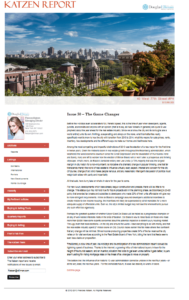Before the Holidays even accelerate to full, frenetic speed, this is the time of year when developers, agents, pundits, economists and anyone with an opinion (that is to say, all New Yorkers in general) are quick to wax prophetic about the year ahead for the real estate industry. Since we all know the city and its boroughs are a world entirely unto its own, thrilling, exasperating and always on the move, what Manhattanites really, specifically want to know is how the city will transition from 2013 to 2014, what this means for sale prices, rents, inventory, new developments and the different ways we make our homes and livelihoods here.
Among the most compelling and impactful distinctions of 2013 was the election of a new mayor for the first time in twelve years. Given the meteoric boom in real estate growth throughout the Bloomberg administration, which weathered the worst economic downturn since the Great Depression and the devastation of Hurricanes Irene and Sandy, many are left to wonder how the election of Bill de Blasio will or won’t alter a prosperous and thriving cityscape. What’s more, de Blasio’s landslide victory over Joe Lhota (a 73% majority that was the largest margin in city history for a non-incumbent) is indicative of a dramatic change in popular thinking, one that far transcends merely the world of real estate to influence virtually every aspect, interest and concern for the city. Of course, change of any kind makes people nervous, and any reasonably intelligent discussion of politics must weigh both sides with parity and impartiality.
All that said, here is my take on what’s in store for the year to come.
For new luxury developments which have already begun construction and presale, there will be little to no change. This status quo may not hold true for future projects still in the planning phase, as Bloomberg’s 20-80 policy that awarded tax breaks and subsidies to developers who made 20% of their units affordable will give way to more stringent requirements. While de Blasio’s campaign assured developers additional incentives to create middle-to-low income housing, the incentives will likely be superseded by strict mandates for a more adequate supply of affordable units. Even so, the city’s limited budget may not have the wherewithal to pursue any such effort too vigorously.
Perhaps the greatest question of whether Mayor Elect De Blasio will be hailed as a progressive champion or an ally of well-heeled interests rests in the area of taxation. De Blasio’s vow to raise taxes on those who make more than $500K have some experts concerned about the potential impact on a vibrant luxury housing market. The ugly truth that most elections—in the city and around the world—have everything to do with money, and that the real estate industry spent $7 million alone on City Council races earlier this fall make others feel confident that any change will be minimal. Since income-producing properties create 34% of the tax revenue the city relies on for vital services according to the Real Estate Board of New York, biting the hand that feeds seems even less viable an proposition.
Traditionally a slow time of year, the Holidays and the anticipation of a new administration haven’t slowed the lightning speed of business. Thanks to the Internet, a growing influx of international buyers in town for the height of the tourist season, and an inventory situation that looks to get even worse before it gets better, buyers aren’t waiting for rising mortgage rates or the threat of tax changes to move on property.
The game changer: the influence of an historic 12-year administration cannot be undone in the next four years—or at the very least, the next two years. For the immediate future, it looks like stability is what’s in store.

